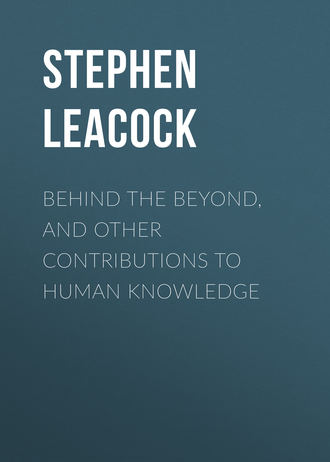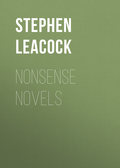
Стивен Ликок
Behind the Beyond, and Other Contributions to Human Knowledge
III.—My Lost Opportunities
THE other day I took a walk with a real estate man. Out in the suburbs he leaned over the wooden fence of an empty lot and waved his hand at it.
"There's a lot," he said, "that we sold last week for half a million dollars."
"Did you really!" I exclaimed.
"Yes," he said, "and do you know that twenty-five years ago you could have picked that up for fifty thousand!"
"What," I said, "do you mean to say that I could have had all that beautiful grass and those mullin stalks for fifty thousand dollars?"
"I do."
"You mean that when I was a student at college, feeding on four dollars a week, this opportunity was knocking at the door and I missed it?"
I turned my head away in bitterness as I thought of my own folly. Why had I never happened to walk out this way with fifty thousand dollars in my pocket and buy all this beautiful mud?
The real estate man smiled complacently at my grief.
"I can show you more than that," he said. "Do you see that big stretch of empty ground out there past that last fence?"
"Yes, yes," I said excitedly, "the land with the beautiful tar-paper shack and the withered cedar tree,—the one withered cedar tree,—standing in its lonely isolation and seeming to beckon–"
"Say," he said, "was you ever in the real estate business yourself?"
"No," I answered, "but I have a poetic mind, and I begin to see the poetry, the majesty, of real estate."
"Oh, is that it," he answered. "Well, that land out there,—it's an acre and a half,—was sold yesterday for three million dollars!!"
"For what!"
"For three million dollars, cold."
"Not COLD!" I said, "don't tell me it was cold."
"Yes," went on the real estate man, "and only three years ago you could have come out here and had it for a song!"
"For a song!" I repeated.
Just think of it! And I had missed it! With a voice like mine. If I had known what I know now, I would have come out to that land and sung to it all night. I never knew in the days when I was content with fifteen dollars a week what a hidden gift my voice was. I should have taken up land-singing and made a fortune out of it.
The thought of it saddened me all the way home: and the talk of the real estate man as he went made me feel still worse.
He showed me a church that I could have bought for a hundred thousand and sold now at half a million for a motor garage. If I had started buying churches instead of working on a newspaper, I'd have been rich to-day.
There was a skating rink I could have bought, and a theatre and a fruit store, a beautiful little one-story wooden fruit store, right on a corner, with the darlingest Italian in it that you ever saw. There was the cutest little pet of a cow-stable that I could have turned into an apartment store at a profit of a million,—at the time when I was studying Greek and forgetting it. Oh! the wasted opportunities of life!
And that evening when I got back to the club and talked about it at dinner to my business friends, I found that I had only heard a small part of it.
Real estate! That's nothing! Why they told me that fifteen years ago I could have had all sorts of things,—trunk line railways, sugar refineries, silver mines,—any of them for a song. When I heard it I was half glad I hadn't sung for the land. They told me that there was a time when I could have bought out the Federal Steel Co. for twenty million dollars! And I let it go.
The whole Canadian Pacific Railway, they said, was thrown on the market for fifty millions. I left it there writhing, and didn't pick it up. Sheer lack of confidence! I see now why these men get rich. It's their fine, glorious confidence, that enables them to write out a cheque for fifty million dollars and think nothing of it.
If I wrote a cheque like that, I'd be afraid of going to Sing Sing. But they aren't, and so they get what they deserve.
Forty-five years ago,—a man at the club told me this with almost a sob in his voice,—either Rockefeller or Carnegie could have been bought clean up for a thousand dollars!
Think of it!
Why didn't my father buy them for me, as pets, for my birthday and let me keep them till I grew up?
If I had my life over again, no school or education for me! Not with all this beautiful mud and these tar-paper shacks and corner lot fruit stores lying round! I'd buy out the whole United States and take a chance, a sporting chance, on the rise in values.
IV.—My Unknown Friend
HE STEPPED into the smoking compartment of the Pullman, where I was sitting alone.
He had on a long fur-lined coat, and he carried a fifty-dollar suit case that he put down on the seat.
Then he saw me.
"Well! well!" he said, and recognition broke out all over his face like morning sunlight.
"Well! well!" I repeated.
"By Jove!" he said, shaking hands vigorously, "who would have thought of seeing you?"
"Who, indeed," I thought to myself.
He looked at me more closely.
"You haven't changed a bit," he said.
"Neither have you," said I heartily.
"You may be a little stouter," he went on critically.
"Yes," I said, "a little; but you're stouter yourself."
This of course would help to explain away any undue stoutness on my part.
"No," I continued boldly and firmly, "you look just about the same as ever."
And all the time I was wondering who he was. I didn't know him from Adam; I couldn't recall him a bit. I don't mean that my memory is weak. On the contrary, it is singularly tenacious. True, I find it very hard to remember people's names; very often, too, it is hard for me to recall a face, and frequently I fail to recall a person's appearance, and of course clothes are a thing one doesn't notice. But apart from these details I never forget anybody, and I am proud of it. But when it does happen that a name or face escapes me I never lose my presence of mind. I know just how to deal with the situation. It only needs coolness and intellect, and it all comes right.
My friend sat down.
"It's a long time since we met," he said.
"A long time," I repeated with something of a note of sadness. I wanted him to feel that I, too, had suffered from it.
"But it has gone very quickly."
"Like a flash," I assented cheerfully.
"Strange," he said, "how life goes on and we lose track of people, and things alter. I often think about it. I sometimes wonder," he continued, "where all the old gang are gone to."
"So do I," I said. In fact I was wondering about it at the very moment. I always find in circumstances like these that a man begins sooner or later to talk of the "old gang" or "the boys" or "the crowd." That's where the opportunity comes in to gather who he is.
"Do you ever go back to the old place?" he asked.
"Never," I said, firmly and flatly. This had to be absolute. I felt that once and for all the "old place" must be ruled out of the discussion till I could discover where it was.
"No," he went on, "I suppose you'd hardly care to."
"Not now," I said very gently.
"I understand. I beg your pardon," he said, and there was silence for a few moments.
So far I had scored the first point. There was evidently an old place somewhere to which I would hardly care to go. That was something to build on.
Presently he began again.
"Yes," he said, "I sometimes meet some of the old boys and they begin to talk of you and wonder what you're doing."
"Poor things," I thought, but I didn't say it.
I knew it was time now to make a bold stroke; so I used the method that I always employ. I struck in with great animation.
"Say!" I said, "where's Billy? Do you ever hear anything of Billy now?"
This is really a very safe line. Every old gang has a Billy in it.
"Yes," said my friend, "sure—Billy is ranching out in Montana. I saw him in Chicago last spring,—weighed about two hundred pounds,—you wouldn't know him."
"No, I certainly wouldn't," I murmured to myself.
"And where's Pete?" I said. This was safe ground. There is always a Pete.
"You mean Billy's brother," he said.
"Yes, yes, Billy's brother Pete. I often think of him."
"Oh," answered the unknown man, "old Pete's quite changed,—settled down altogether." Here he began to chuckle, "Why, Pete's married!"
I started to laugh, too. Under these circumstances it is always supposed to be very funny if a man has got married. The notion of old Peter (whoever he is) being married is presumed to be simply killing. I kept on chuckling away quietly at the mere idea of it. I was hoping that I might manage to keep on laughing till the train stopped. I had only fifty miles more to go. It's not hard to laugh for fifty miles if you know how.
But my friend wouldn't be content with it.
"I often meant to write to you," he said, his voice falling to a confidential tone, "especially when I heard of your loss."
I remained quiet. What had I lost? Was it money? And if so, how much? And why had I lost it? I wondered if it had ruined me or only partly ruined me.
"One can never get over a loss like that," he continued solemnly.
Evidently I was plumb ruined. But I said nothing and remained under cover, waiting to draw his fire.
"Yes," the man went on, "death is always sad."
Death! Oh, that was it, was it? I almost hiccoughed with joy. That was easy. Handling a case of death in these conversations is simplicity itself. One has only to sit quiet and wait to find out who is dead.
"Yes," I murmured, "very sad. But it has its other side, too."
"Very true, especially, of course, at that age."
"As you say at that age, and after such a life."
"Strong and bright to the last I suppose," he continued, very sympathetically.
"Yes," I said, falling on sure ground, "able to sit up in bed and smoke within a few days of the end."
"What," he said, perplexed, "did your grandmother–"
My grandmother! That was it, was it?
"Pardon me," I said provoked at my own stupidity; "when I say smoked, I mean able to sit up and be smoked to, a habit she had,—being read to, and being smoked to,—only thing that seemed to compose her–"
As I said this I could hear the rattle and clatter of the train running past the semaphores and switch points and slacking to a stop.
My friend looked quickly out of the window.
His face was agitated.
"Great heavens!" he said, "that's the junction. I've missed my stop. I should have got out at the last station. Say, porter," he called out into the alleyway, "how long do we stop here?"
"Just two minutes, sah," called a voice back. "She's late now, she's makin' up tahm!"
My friend had hopped up now and had pulled out a bunch of keys and was fumbling at the lock of the suit case.
"I'll have to wire back or something," he gasped. "Confound this lock—my money's in the suit case."
My one fear now was that he would fail to get off.
"Here," I said, pulling some money out of my pocket, "don't bother with the lock. Here's money."
"Thanks," he said grabbing the roll of money out of my hand,—in his excitement he took all that I had.—"I'll just have time."
He sprang from the train. I saw him through the window, moving toward the waiting-room. He didn't seem going very fast.
I waited.
The porters were calling, "All abawd! All abawd." There was the clang of a bell, a hiss of steam, and in a second the train was off.
"Idiot," I thought, "he's missed it;" and there was his fifty-dollar suit case lying on the seat.
I waited, looking out of the window and wondering who the man was, anyway.
Then presently I heard the porter's voice again. He evidently was guiding someone through the car.
"Ah looked all through the kyar for it, sah," he was saying.
"I left it in the seat in the car there behind my wife," said the angry voice of a stranger, a well-dressed man who put his head into the door of the compartment.
Then his face, too, beamed all at once with recognition. But it was not for me. It was for the fifty-dollar valise.
"Ah, there it is," he cried, seizing it and carrying it off.
I sank back in dismay. The "old gang!" Pete's marriage! My grandmother's death! Great heavens! And my money! I saw it all; the other man was "making talk," too, and making it with a purpose.
Stung!
And next time that I fall into talk with a casual stranger in a car, I shall not try to be quite so extraordinarily clever.
V.—Under the Barber's Knife
"WAS you to the Arena the other night?" said the barber, leaning over me and speaking in his confidential whisper.
"Yes," I said, "I was there."
He saw from this that I could still speak. So he laid another thick wet towel over my face before he spoke again.
"What did you think of the game," he asked.
But he had miscalculated. I could still make a faint sound through the wet towels. He laid three or four more very thick ones over my face and stood with his five finger tips pressed against my face for support. A thick steam rose about me. Through it I could hear the barber's voice and the flick-flack of the razor as he stropped it.
"Yes, sir," he went on in his quiet professional tone, punctuated with the noise of the razor, "I knowed from the start them boys was sure to win,"—flick-flack-flick-flack,—"as soon as I seen the ice that night and seen the get-away them boys made I knowed it,"—flick-flack,—"and just as soon as Jimmy got aholt of the puck–"
This was more than the barber at the next chair could stand.
"Him get de puck," he cried, giving an angry dash with a full brush of soap into the face of the man under him,—"him get ut-dat stiff—why, boys," he said, and he turned appealingly to the eight barbers, who all rested their elbows on the customers' faces while they listened to the rising altercation; even the manicure girl, thrilled to attention, clasped tight the lumpy hand of her client in her white digits and remained motionless,—"why boys, dat feller can't no more play hockey than–"
"See here," said the barber, suddenly and angrily, striking his fist emphatically on the towels that covered my face. "I'll bet you five dollars to one Jimmy can skate rings round any two men in the league."
"Him skate," sneered the other squirting a jet of blinding steam in the face of the client he was treating, "he ain't got no more go in him than dat rag,"—and he slapped a wet towel across his client's face.
All the barbers were excited now. There was a babel of talk from behind each of the eight chairs. "He can't skate;" "He can skate;" "I'll bet you ten."
Already they were losing their tempers, slapping their customers with wet towels and jabbing great brushfuls of soap into their mouths. My barber was leaning over my face with his whole body. In another minute one or the other of them would have been sufficiently provoked to have dealt his customer a blow behind the ear.
Then suddenly there was a hush.
"The boss," said one.
In another minute I could realize, though I couldn't see it, that a majestic figure in a white coat was moving down the line. All was still again except the quiet hum of the mechanical shampoo brush and the soft burble of running water.
The barber began removing the wet towels from my face one by one. He peeled them off with the professional neatness of an Egyptologist unwrapping a mummy. When he reached my face he looked searchingly at it. There was suspicion in his eye.
"Been out of town?" he questioned.
"Yes," I admitted.
"Who's been doing your work?" he asked. This question, from a barber, has no reference to one's daily occupation. It means "who has been shaving you."
I knew it was best to own up. I'd been in the wrong, and I meant to acknowledge it with perfect frankness.
"I've been shaving myself," I said.
My barber stood back from me in contempt. There was a distinct sensation all down the line of barbers. One of them threw a wet rag in a corner with a thud, and another sent a sudden squirt from an atomizer into his customer's eyes as a mark of disgust.
My barber continued to look at me narrowly.
"What razor do you use?" he said.
"A safety razor," I answered.
The barber had begun to dash soap over my face; but he stopped—aghast at what I had said.
A safety razor to a barber is like a red rag to a bull.
"If it was me," he went on, beating lather into me as he spoke, "I wouldn't let one of them things near my face: No, sir: There ain't no safety in them. They tear the hide clean off you—just rake the hair right out by the follicles," as he said this he was illustrating his meaning with jabs of his razor,—"them things just cut a man's face all to pieces," he jabbed a stick of alum against an open cut that he had made,—"And as for cleanliness, for sanitation, for this here hygiene and for germs, I wouldn't have them round me for a fortune."
I said nothing. I knew I had deserved it, and I kept quiet.
The barber gradually subsided. Under other circumstances he would have told me something of the spring training of the baseball clubs, or the last items from the Jacksonville track, or any of those things which a cultivated man loves to hear discussed between breakfast and business. But I was not worth it. As he neared the end of the shaving he spoke again, this time in a confidential, almost yearning, tone.
"Massage?" he said.
"No thank you."
"Shampoo the scalp?" he whispered.
"No thanks."
"Singe the hair?" he coaxed.
"No thanks."
The barber made one more effort.
"Say," he said in my ear, as a thing concerning himself and me alone, "your hair's pretty well all falling out. You'd better let me just shampoo up the scalp a bit and stop up them follicles or pretty soon you won't—"
"No, thank you," I said, "not to-day."
This was all the barber could stand. He saw that I was just one of those miserable dead-beats who come to a barber shop merely for a shave, and who carry away the scalp and the follicles and all the barber's perquisites as if they belonged to them.
In a second he had me thrown out of the chair.
"Next," he shouted.
As I passed down the line of the barbers, I could see contempt in every eye while they turned on the full clatter of their revolving shampoo brushes and drowned the noise of my miserable exit in the roar of machinery.
PARISIAN PASTIMES
I.—The Advantages of a Polite Education
"TAKE it from me," said my friend from Kansas, leaning back in his seat at the Taverne Royale and holding his cigar in his two fingers—"don't talk no French here in Paris. They don't expect it, and they don't seem to understand it."
This man from Kansas, mind you, had a right to speak. He knew French. He had learned French—he told me so himself—good French, at the Fayetteville Classical Academy. Later on he had had the natural method "off" a man from New Orleans. It had cost him "fifty cents a throw." All this I have on his own word. But in France something seemed to go wrong with his French.
"No," he said reflectively, "I guess what most of them speak here is a sort of patois."
When he said it was a patois, I knew just what he meant. It was equivalent to saying that he couldn't understand it.
I had seen him strike patois before. There had been a French steward on the steamer coming over, and the man from Kansas, after a couple of attempts, had said it was no use talking French to that man. He spoke a hopeless patois. There were half a dozen cabin passengers, too, returning to their homes in France. But we soon found from listening to their conversation on deck that what they were speaking was not French but some sort of patois.
It was the same thing coming through Normandy. Patois, everywhere, not a word of French—not a single sentence of the real language, in the way they had it at Fayetteville. We stopped off a day at Rouen to look at the cathedral. A sort of abbot showed us round. Would you believe it, that man spoke patois, straight patois—the very worst kind, and fast. The man from Kansas had spotted it at once. He hadn't listened to more than ten sentences before he recognized it. "Patois," he said.
Of course, it's fine to be able to detect patois like this. It's impressive. The mere fact that you know the word patois shows that you must be mighty well educated.
Here in Paris it was the same way. Everybody that the man from Kansas tried—waiters, hotel clerks, shop people—all spoke patois. An educated person couldn't follow it.
On the whole, I think the advice of the man from Kansas is good. When you come to Paris, leave French behind. You don't need it, and they don't expect it of you.
In any case, you soon learn from experience not to use it.
If you try to, this is what happens. You summon a waiter to you and you say to him very slowly, syllable by syllable, so as to give him every chance in case he's not an educated man:
"Bringez moi de la soupe, de la fish, de la roast pork et de la fromage."
And he answers:
"Yes, sir, roast pork, sir, and a little bacon on the side?"
That waiter was raised in Illinois.
Or suppose you stop a man on the street and you say to him:
"Musshoo, s'il vous plait, which is la direction pour aller à le Palais Royal?"
And he answers:
"Well, I tell you, I'm something of a stranger here myself, but I guess it's straight down there a piece."
Now it's no use speculating whether that man comes from Dordogne Inférieure or from Auvergne-sur-les-Puits because he doesn't.
On the other hand, you may strike a real Frenchman—there are some even in Paris. I met one the other day in trying to find my way about, and I asked him:
"Musshoo, s'il vous plait, which is la direction pour aller à Thomas Cook & Son?"
"B'n'm'ss'ulvla'n'fsse'n'sse'pas!"
I said: "Thank you so much! I had half suspected it myself." But I didn't really know what he meant.
So I have come to make it a rule never to use French unless driven to it. Thus, for example, I had a tremendous linguistic struggle in a French tailors shop.
There was a sign in the window to the effect that "completes" might be had "for a hundred." It seemed a chance not to be missed. Moreover, the same sign said that English and German were spoken.
So I went in. True to my usual principle of ignoring the French language, I said to the head man:
"You speak English?"
He shrugged his shoulders, spread out his hands and looked at the clock on the wall.
"Presently," he said.
"Oh," I said, "you'll speak it presently. That's splendid. But why not speak it right away?"
The tailor again looked at the clock with a despairing shrug.
"At twelve o'clock," he said.
"Come now," I said, "be fair about this. I don't want to wait an hour and a half for you to begin to talk. Let's get at it right now."
But he was obdurate. He merely shook his head and repeated:
"Speak English at twelve o'clock."
Judging that he must be under a vow of abstinence during the morning, I tried another idea.
"Allemand?" I asked, "German, Deutsch, eh! speak that?"
Again the French tailor shook his head, this time with great decision.
"Not till four o'clock," he said.
This was evidently final. He might be lax enough to talk English at noon, but he refused point-blank to talk German till he had his full strength.
I was just wondering whether there wasn't some common sense in this after all, when the solution of it struck me.
"Ah!" I said, speaking in French, "très bong! there is somebody who comes at twelve, quelqu'un qui vient à midi, who can talk English."
"Precisément," said the tailor, wreathed in smiles and waving his tape coquettishly about his neck.
"You flirt!" I said, "but let's get to business. I want a suit, un soot, un complete, complet, comprenez-vous, veston, gilet, une pair de panteloon—everything—do you get it?"
The tailor was now all animation.
"Ah, certainement," he said, "monsieur desires a fantasy, une fantaisie, is it not?"
A fantasy! Good heavens!
The man had evidently got the idea from my naming so many things that I wanted a suit for a fancy dress carnival.
"Fantasy nothing!" I said—"pas de fantaisie! un soot anglais"—here an idea struck me and I tapped myself on the chest—"like this," I said, "comme ceci."
"Bon," said the tailor, now perfectly satisfied, "une fantaisie comme porte monsieur."
Here I got mad.
"Blast you," I said, "this is not a fantaisie. Do you take me for a dragon-fly, or what? Now come, let's get this fantaisie business cleared up. This is what I want"—and here I put my hand on a roll of very quiet grey cloth on the counter.
"Très bien," said the tailor, "une fantaisie."
I stared at him.
"Is that a fantaisie?"
"Certainement, monsieur."
"Now," I said, "let's go into it further," and I touched another piece of plain pepper and salt stuff of the kind that is called in the simple and refined language of my own country, gents' panting.
"This?"
"Une fantaisie," said the French tailor.
"Well," I said, "you've got more imagination than I have."
Then I touched a piece of purple blue that would have been almost too loud for a Carolina nigger.
"Is this a fantaisie?"
The tailor shrugged his shoulders.
"Ah, non," he said in deprecating tones.
"Tell me," I said, speaking in French, "just exactly what it is you call a fantasy."
The tailor burst into a perfect paroxysm of French, gesticulating and waving his tape as he put the sentences over the plate one after another. It was fast pitching, but I took them every one, and I got him.
What he meant was that any single colour or combination of single colours—for instance, a pair of sky blue breeches with pink insertion behind—is not regarded by a French tailor as a fantaisie or fancy. But any mingled colour, such as the ordinary drab grey of the business man is a fantaisie of the daintiest kind. To the eye of a Parisian tailor, a Quakers' meeting is a glittering panorama of fantaisies, whereas a negro ball at midnight in a yellow room with a band in scarlet, is a plain, simple scene.
I thanked him. Then I said:
"Measure me, mesurez-moi, passez le tape line autour de moi."
He did it.
I don't know what it is they measure you in, whether in centimètres or cubic feet or what it is. But the effect is appalling.
The tailor runs his tape round your neck and calls "sixty!" Then he puts it round the lower part of the back—at the major circumference, you understand,—and shouts, "a hundred and fifty!"
It sounded a record breaker. I felt that there should have been a burst of applause. But, to tell the truth, I have friends—quiet sedentary men in the professoriate—who would easily hit up four or five hundred on the same scale.
Then came the last item.
"Now," I said, "when will this 'complete' be ready?"
"Ah, monsieur," said the tailor, with winsome softness, "we are very busy, crushed, écrasés with commands! Give us time, don't hurry us!"
"Well," I said, "how long do you want?"
"Ah, monsieur," he pleaded, "give us four days!"
I never moved an eyelash.
"What!" I said indignantly, "four days! Monstrous! Let me have this whole complete fantasy in one day or I won't buy it."
"Ah, monsieur, three days?"
"No," I said, "make it two days."
"Two days and a half, monsieur."
"Two days and a quarter," I said; "give it me the day after to-morrow at three o'clock in the morning."
"Ah, monsieur, ten o'clock."
"Make it ten minutes to ten and it's a go," I said.
"Bon," said the tailor.
He kept his word. I am wearing the fantaisie as I write. For a fantaisie, it is fairly quiet, except that it has three pockets on each side outside, and a rolled back collar suitable for the throat of an opera singer, and as many buttons as a harem skirt. Beyond that, it's a first-class, steady, reliable, quiet, religious fantaisie, such as any retired French ballet master might be proud to wear.







